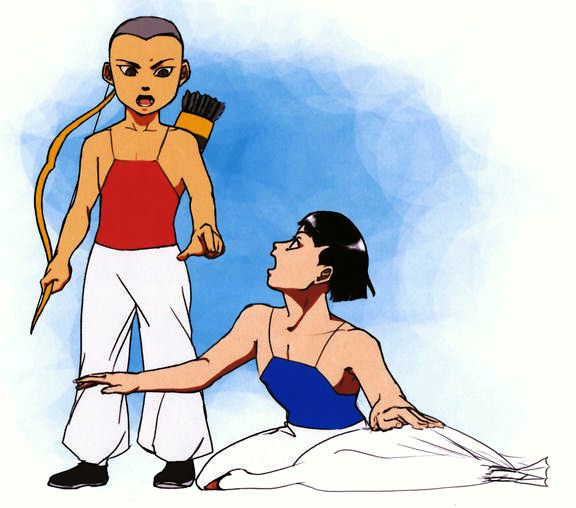
Típó-dáduō was furious and demanded to have the bird.
Drawing by Kari Francis, Sixth College (UCSD), Class of 2011, by permission
Under Móhē-bōshé-bōtí's care, Prince Xīdá-duō grew strong and handsome and was much admired. And he had quite miraculous abilities in everything.
When he was eight, the king invited all the best teachers, who taught him to read and to calculate and to shoot with a bow and to drive a chariot. He revered his teachers, learned well, forgot nothing, and was the most outstanding among all the princes in everything he undertook.
"And well he should be!" thought his father proudly, for as the oldest son of the senior wife, he would one day inherit the throne. But of course the real reason was that he had been sent to teach humanity how to avoid suffering.
Even his chariot horse loved him, and the wild animals. He loved them too, and never harmed any living thing. For example, one day he saw another child about to kill a snake with a large stick, and stopped him.

Among the royal children who played together in the palace gardens there was one Prince Típó-dáduō 提婆达多, who was a cousin to Xīdá-duō , but was of very different character, for Típó-dáduō liked to cause trouble and to kill things.
One day Típó-dáduō shot a swan in the wing with an arrow and it fell to the ground gravely injured. Xīdá-duō rushed to pick it up and extract the arrow and try to stench the flow of blood.
Típó-dáduō was furious and demanded to have the bird. Xīdá-duō refused, insisting that as long as the swan lived it deserved care.
In the end, they took the dispute to the court sages, who discussed the matter for a long time. The sages had great difficulty agreeing. It was long the convention that the prey belonged to the hunter. But caring for suffering living beings was clearly a noble sentiment. In the end, the latter opinion prevailed, and the sages ruled that the bird belonged to Xīdá-duō because he would shelter its life, while Típó-dáduō would end its life.
So Xīdá-duō took the bird and nursed it and then released it back into the forest. And from that moment on, Típó-dáduō resented Xīdá-duō .